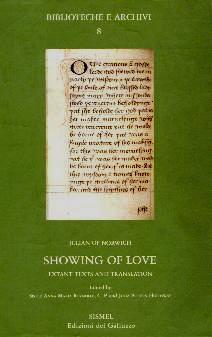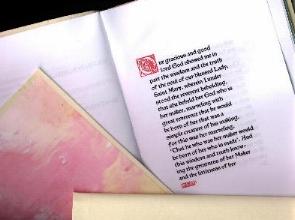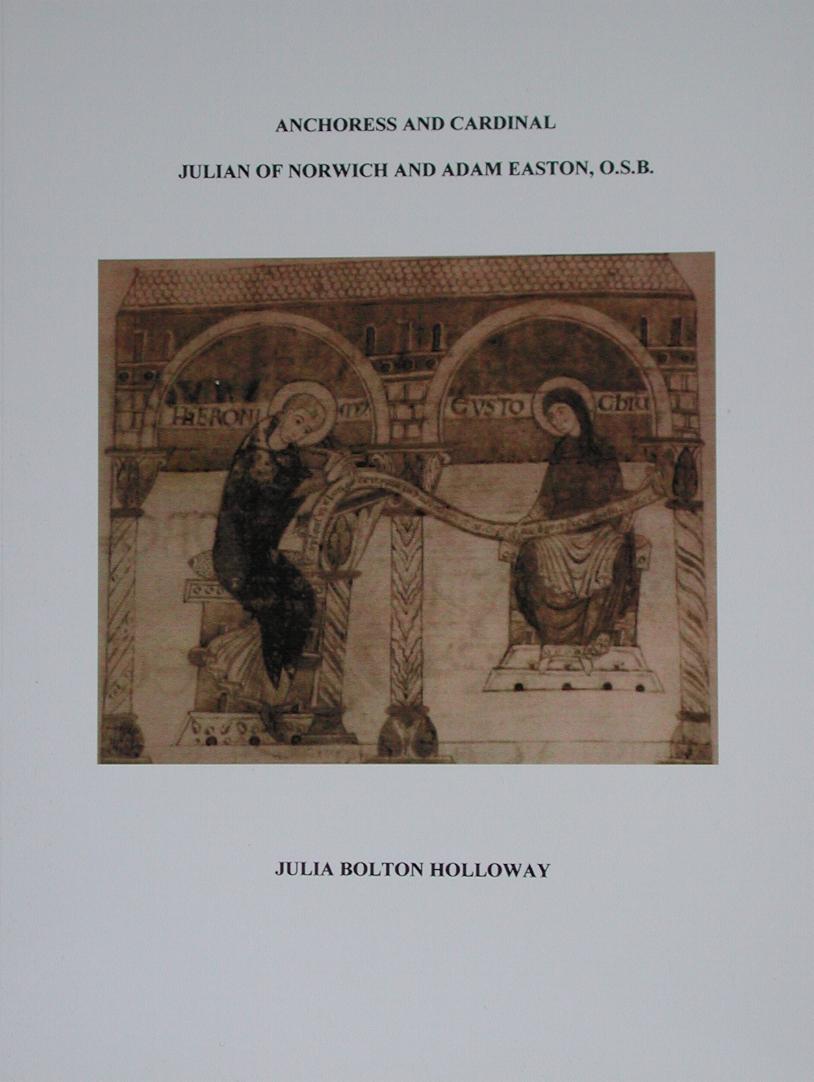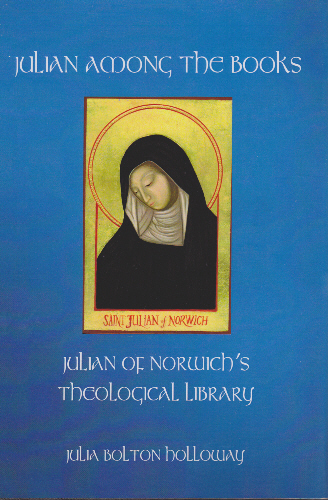Dame Barbara Constable, O.S.B., and the Upholland Julian of Norwich Fragment (original) (raw)
JULIAN OF NORWICH, HER SHOWING OF LOVE AND ITS CONTEXTS �1997-2024 JULIA BOLTON HOLLOWAY | || JULIAN OF NORWICH || SHOWING OF LOVE || HER TEXTS ||HER SELF || ABOUT HER TEXTS || BEFORE JULIAN || HER CONTEMPORARIES || AFTER JULIAN || JULIAN IN OUR TIME || ST BIRGITTA OF SWEDEN || BIBLE AND WOMEN || EQUALLY IN GOD'S IMAGE || MIRROR OF SAINTS || BENEDICTINISM || THE CLOISTER || ITS SCRIPTORIUM || AMHERST MANUSCRIPT || PRAYER || CATALOGUE AND PORTFOLIO (HANDCRAFTS, BOOKS ) || BOOK REVIEWS || BIBLIOGRAPHY ||
DAME BARBARA CONSTABLE, O.S.B.,
AND THE UPHOLLAND JULIAN'S SHOWING OF LOVE (U)FRAGMENT

Dame Barbara Constable, O.S.B.
INTRODUCTION
 n the seventeenth century exiled English nuns were reading, copying out and contemplating upon fourteenth-century texts, one of these being Julian of Norwich's Showing of Love. Dame Barbara Constable, O.S.B., in particular, in her clearly legible hand, was responsible for the copying out of innumerable Augustine Baker manuscripts, - as they are called by English Benedictine monks. But many of these texts are less those of Father Augustine Baker, O.S.B.,'s writings, than they are of the writings of mystics which he encouraged the English Benedictine nuns to use in their own devotional writings, for their own libraries for contemplation. Dame Barbara Constable in these pages is copying out St Teresa of Avila, Henry Suso , Julian of Norwich (whom she calls 'St Iulian') and John Tauler . She herself never left Cambrai once she entered in 1638, yet her manuscripts made their way to Paris and also to the men's Benedictine abbeys and to the mission in England.
n the seventeenth century exiled English nuns were reading, copying out and contemplating upon fourteenth-century texts, one of these being Julian of Norwich's Showing of Love. Dame Barbara Constable, O.S.B., in particular, in her clearly legible hand, was responsible for the copying out of innumerable Augustine Baker manuscripts, - as they are called by English Benedictine monks. But many of these texts are less those of Father Augustine Baker, O.S.B.,'s writings, than they are of the writings of mystics which he encouraged the English Benedictine nuns to use in their own devotional writings, for their own libraries for contemplation. Dame Barbara Constable in these pages is copying out St Teresa of Avila, Henry Suso , Julian of Norwich (whom she calls 'St Iulian') and John Tauler . She herself never left Cambrai once she entered in 1638, yet her manuscripts made their way to Paris and also to the men's Benedictine abbeys and to the mission in England.
One reason for the great amount of copying done by Dame Barbara Constable and others at Cambrai was because of dissension amongst the English Benedictines, the nuns desiring to continue Father Augustine Baker's contemplative practices, for which he had obtained for them medieval manuscripts from Sir Robert Cotton during his time at Cambrai, 1624-1633, the monks wishing to suppress this activity and call in and censor these texts, first in 1633 and again in 1655. To prevent their loss the nuns, amidst great poverty, even established a daughter house in Paris, in 1651, taking to it duplicates of all their texts, hurriedly made out 1650-1651. Manuscripts of Julian's Showing of Love are mentioned twice in their catalogue, now in the Biblioth�que Mazarine, which was confiscated from the English nuns at the French Revolution. In 1655 the nuns defied the monks, going so far as to threaten to withdraw from the English Benedictine Congregation, rather than relinquish their books on spirituality, their most prized being Julian's Showings. The nuns in Paris had already in their Consitution itself, written out both in English by Dame Clementia Cary, O.S.B., in English, and in French by Dame Bridget More, O.S.B., stated that the community would continue in the contemplative practices taught them by the Venerable Augustine Baker, O.S.B. The English nuns in exile were preserving Julian of Norwich's Showing of Love three hundred years after it was written in Norwich and three hundred years before we ourselves - around the world - could hold her text in our hands.
Serenus Cressy, O.S.B., became the chaplain at the Paris daughter house for a brief period, having already strong associations with the Cary family. He published Augustine Baker's Sancta Sophia or Holy Wisdom , describing these devotional practices based on the Cloud Author's writings, William Flete's Remedies Against Temptations (thought to be by Richard Rolle) and Hilton's Scale of Perfection with its prayer of the pilgrim, 'I am nought, I have nought, I seek nought, but sweet Jesus in Jerusalem'. Cressy also published the writings of Dame Gertrude More, Dame Bridget More's sister, who had founded the Cambrai mother house. These two biological sisters were direct descendants of St Thomas More. Then in 1670 Cressy published the editio princeps, the first edition, of Julian of Norwich's Showings . That text was carefully transcribed in preparation for this publication in England by these English nuns in exile in France, and to do so they collated all their manuscripts of Julian, one of them a now lost medieval exemplar to the two Sloane versions of the Long Text, another a Tudor exemplar like that of Paris, copied out by them into Stowe 42. Thus these nuns had in their possession no less than seven manuscripts in total or in part of Julian's Showing of Love, five of which still exist, two at Cambrai being lost at the Revolution.
Following the French Revolution these English Benedictine nuns returned to England, bringing some of their fine library of medieval contemplative texts with them, while other manuscript books of theirs remain in France. But the Cambrai collection was largely lost, those English Benedictines having been imprisoned at Compi�gne with the French Carmelites, the latter of whom were then guillotined , the English nuns inheriting their clothing. Cambrai's Our Lady of Consolation is today Stanbrook Abbey in Worcester, Paris' Our Lady of Good Hope is St Mary's Abbey, Colwich, Stafford.
Of interest is that Dame Margaret Gascoigne and Dame Barbara Constable both present Christ's words to Julian in larger letters, a trait seen also in Westminster in one instance, and throughout in Sloane 3709 . When Serenus Cressy took Stowe 42, which instead reduces these words both to differentiate them from the rest of the text, and to save paper, the printer elected to print them instead in italics. In the Paris Manuscript, which at this time was still in Rouen where the Brigittine nuns had left it in their flight in time of war to Lisbon, and to which the English Benedictines lacked all access,Christ's words to Julian are in red, rubricated, a practice familiar to the Brigittines who customarily wrote the Office books so for the next entrant into Syon Abbey following themselves.
Dame Barbara selected fine passages from Julian's Showing of Love, culling these from the Twelfth and Thirteenth Revelations and from Chapters 28, 30 and 32, then followed that selection with a discussion on the Way of Perfection as exemplified in the writings of the two Friends of God, Henry Suso and John Tauler , all of the fourteenth century.
When Hywel Wyn Owen examined the Upholland Manuscript he found it was bound in a piece of the same office book as another manuscript at Colwich, H18, which also contains a fragment from Julian's Showings. This other manuscript is where Dame Bridget More, O.S.B., descendant of St Thomas More, copied out the contemplative anthology written originally by Dame Margaret Gascoigne , O.S.B., who had died at Cambrai in 1637.
This Upholland Manuscript became separated from both Abbeys and, according to the Julian scholar, Sister Benedicta Ward, S.L.G, who sought information concerning it, is lost. But Father Eric Colledge, O.S.A., had earlier given to Stanbrook a bound photocopy of the entire text. Because the foliation in the manuscript is incorrect, the verso being written not on the back of the folio but on the subsequent page, that given in Hywel Wyn Owen and Luke Bell's article, 'The Upholland Anthology: An Augustine Baker Manuscript', The Downside Review (1989), 274-292, is also incorrect, so when I requested Dame Easnwyth Edwards, O.S.B., to photocopy for me the relevant Julian pages, two are lacking. I supply them from Hywel Wyn Owen's transcription. The remainder is taken directly from the photocopy of the Upholland Manuscript. It also gives the two following pages, which are not Julian's_Showing of Love_, but instead a discourse upon the way of perfection, citing Suso and Tauler .
THE UPHOLLAND MANUSCRIPT:
JULIAN OF NORWICH, SHOWING OF LOVE

[Folio 113v]
St Iulian The 12 reuelation And after this our lord shewed himselfe more glorifyed, as to my sight then I had seene him before; wherin I was learned to know �t our soule shall neuer haue rest till it come into him; knowing that he is full of ioy, homely and curteous, and most blessed and true life. oftentimes our lord Iesu sayd. I it am, That is highest. I it am, that you louest. I it am that thou likest. I it �t �ou seruest. I it am that thou longest after. I it am that �ou desirest. I it am. that thou meanest. I it am, that is all. I it am that shewed myself to thee before.
The number of the words passeth my witts and vnderstanding, and all my mights, for they were in the highest, as to my sight;
[113v]
for therein is comprehended I am not able to tell what, so that it cannot be expressed. But the ioy that I saw in the shewing of them exceedingly surpasseth all that hart can thinke, or soule may desire. And therefore these words (the meaning of them) be not declared heere; but euery one according to the grace god hath giuen him in vnderstanding and louing, let them receaue them in our lords meaning.
The 13 reuelation And after this our lord brought to my mind, �e longing desire I had to him before. And I saw that nothing letted or hindred vs but sinne. And me thought if sinne had not bin, we should all haue bin cleane and pure, and like to our lord as hee made and created vs. And thus in my folly before this time I often wondered why, by �e forsaid great wisedome of god the beginning of sinne was not hindred or preuented, for then me thought �t all should haue bin well. This stirring and
[114v]
thought in my mind; I should haue forsaken
and not haue yealded vnto it; Yet neuer
thelesse it caused me to mourne and sorrow
without discretion. bu�t Jesu who in this
vision enformed me of all thinges that were
needfull, answered by this word and sayd:
'Sinne is behouefull. But all shall be well.'
In this naked worde. Sinne. our lord brought
to my mind generally all that is not good.
The 28 chapter
Thus I saw how Christ hath compassion
on vs for �e cause of sinne, for full well
our lord loveth People that shall bee
saued. That is to say gods servants; Holy
Church shall be shaked in sorrow and an
guish, and tribulation in this world, as a
man shaketh a cloath in �e wind. And as
to this, our lord answered showing in this
manner. Ah. A great thing shall I make
hereof in heauen, of endles worship and
of euerlasting ioy. Yea so far forth I
saw that our lord reioyceth at �e tribu
lation of his servants with pitty and
[114v]
compassion; That to each person �t he lo
ueth and intendeth to bring to his bliss
he layeth on him something, that is to say
some affliction or tribulation, �t is no impe
diment to �e soule in �e sight of God,
therby they be humbled and despised in this
world, scorned, mocked, and contemned by others
And this he doth to hinder and preuent �e
harme wch they are apt to fall into, and
would incurre by �e pride �e pompe and �e
vaine glory of this wretched life, and for
to make their way the more readdy, and
better prepare them to come to heauen,
and enioy his blisse without end euerlasting
for he sayth, I shall all to breake you
from your vaine affections, and your vitius
pride; and after �t I shall gather you
and make you meeke and mild, cleane and
holy by uniting yo_u_ to mee. And then I
saw that each kind compassion �t man hath
one his euen Christian wth charity, it is
christ in him, whose loue to man made
him to esteeme little of all �e paines he
suffered in his passion, wch loue againe
was shewed heere in this compassion, wherin
were two thinges to be understood in our
lords meaning, �e on was �e blisse that we be
[115v]
brought vnto, wherin his will is �t we reioyce
�e other is, for our comfort in our paine and
tribulation: for he will that wee know �t
all shall turne to his worship and to our
profit by �e vertue of his holy passion: and
that we know �t wee suffered right no
thing alone, but with him, and �t we see
him our ground. And that we see his
paines and his tribulations so farre to ex
ceed and surpasse all �t we can suffer,
that it cannot be fully thought or imagined.
And �e well beholding and considering of
this will keepe vs from ouermuch trouble
and despaire in �e feeling of our paines,
and we see verely �t our sinnes deserue
it, yet his loue excuseth vs, and of his
great curtesy he doth away all our blames
and beholdeth vs with ruth and
merveilous pitty as children Innocents
and vnspotted.
The 30 chapter
In this our Lords will is to haue us oc
cupyed and exercise to ioy in him for
he ioyeth in vs. And �e more plenteously
�t we take of this (ioying in our salluation)
wth reuerence and humility, �e more thankes
[116]
we deserue of him, and �e more speedy
and expedient it is to our selues. And thus we
may see and enioy or reioyce in that our
part is our Lord. The other part is
hid and shutt up, or concealed from vs.
�t is to say, all �t is besides our salluation
for that is our lords priuy counsell and
it belongeth to �e Royall Lordship of all_migh_ty
god to haue his priuy counsels in peace.
And it belongeth to his seruants for obe
dience and reuerence to him, not to haue
or will or desire to know his counsels, Our
lord hath pitty and compassion on vs, for
that some creatures do busy themselues
so much therein (seeking and desiring to
know and vnderstand �e secrets of all_migh_ty
god.) And I am sure if we know how
much we should please him and ease
our selues to forbear it we would do it.
The saints in heaven, thay haue a will
to know nothing, but �t w_hi_ch our lord
will shew them. And also their charity
and desire is ruled according to �e will
of our lord. And thus ought we to
haue our will like to them; Then shall
we nothing will nor desire, but �e will
[116]

of our lord like as they do. for we bee
all one in gods meaning. And heer I was
taught �t I should only enioy in our Blessed
Sauiour Jesu, and trust in him for all thinges.
The 32: Chapter
One time our good lord sayde,all man
ner of thing shall be well. And another
time he sayd. Thou shalt see thyselfe
that all manner of things shall be welle
And these two sayings �e soule tooke and
vnderstood in sundry manners. One was
this, �t our lord will that wee know
that he not only taketh care of and hath
regard to noble thinges and to great, but
also to little and to small, to lowe and
to simple, to �e one and to �e other;
And so meaneth he in �t he sayth all
manner of thing shall be well. For he will
that we know �t �e least thing shall not be
forgotten. An other is this, �t there
be many deeds euill donne in our sight
and so great harmes comes, and are taken
thereby �t it seemeth to us that it were
[116v]
impossible �t euer they should come to a
good end. And vpon these wee looke sorrow
full and mourne therfore, so �t it cannot rest
in �e blessedfull holding of God as we should
doe. And �e cause is this, that �e vse of o_u_r
reason and vnderstanding is now so blind &
Lowe that we cannot know nor vnderstand
the high mervailous wisedome, and �e good
nes of the most blessed Trinity. And thus
meaneth he where he sayth Thou
shalt see thy selfe �t all manner
of thing shall be well,' as if he had
sayd take or beleeue faithfully and trust
fully and hearafter thou shalt see it
verely and truely in fullnes of ioy.
And thus in �e same fiue words before
sayd: 'I may make all thinges well
I vnderstood a mighty comfort (�t wee
owght to take) of all �e workes of
our Lord god, that are to come
[The text following that giving excerpts from Julian of Norwich's _Showing of Love_ appears to be a contemplation by Dame Barbara Constable, O.S.B., or from another Benedictine, and copied out by her, concerning the way of perfection as described in the conversions of the Friends of God Henry Suso and John Tauler.]
[117v]
O how exceedingly are we bound to god
for discouering vnto vs this way so ne
cessary, and whereof there is so few
teachers, considering also how many soules
he leaueth in want thereof, and who
if they knew �e way, would ioyfully pro
secute it: O swee Iesus. blessed for e
uer be thy sweet mercyes; O how vn
gratefull shall wee proue if wee doe
not make good vse of this great blessing
of thyne and why should we doubt
of thy assistance in prosecution of
our way since that our good god
of his loue to us and out of his
desire of our saluation and per
fection hath extraordinarily made
knowne vnto us �e way, so will
he not be wanting in his grace
that we may bring all to a per
fect end w_hi_ch he intended in his
discovuery vnto vs of the way
we hauing �e way discouered vnto vs
if we should neglect to tread and
prosecute it with perseuerance it
[117v]
had bin far better for us that we
had neuer knowne it for (sayth
our sauiour) �e servant that know
eth the will of his master and doth
it not shall be beaten with many
stripes.
To come to know �e way how to
serue god in �e way of perfection
there is no meane but �t it must
come from god, and �t by one of
these two meanes either immediately
from god as was �e conuersion and in
structions of Suso and many others
or from him by �e meanes of some
man as was �e conuersion of Thaulerus
and �e like hath bin of many others.
And here Theleurus though he had
his conuersion and some instruction
at �e first from �e Lay man, yet
afterwards in his spirituall course
he was doutles guided by �e spirit
of god (�e lay man not liuing wth him
Bibliography:
Baker, Augustine, Holy Wisdom: Or Directions for the Prayer of Contemplation. Ed. Serenus Cressy. Wheathamstead: Anthony Clarke, 1972.
The Benedictines of Stanbrook. In a Great Tradition: Tribute to Dame Laurentia McLachlan, Abbess of Stanbrook . London: John Murray, 1956.
Heywood, Dame Cecilia, O.S.B. 'Records of the Abbey of Our Lady of Consolation at Cambrai, 1620-1793', ed. Joseph Gillow. Catholic Record Society 13 (1913).
Jebb, Dom Philip. 'A Hitherto Unnoticed Autograph Manuscript of the Venerable Augustine Baker'. The Downside Review (1986), 25-40.
Julian of Norwich. Revelations of Divine Love. Ed. Serenus F. Cressy [actually the English Benedictine nuns of Cambrai and Paris]. 1670.
Newkirk, Terrye, OCDS, 'The Mantle of Elijah: The Martyre of Compi�gne as Prophets of Modern Age', The Teresian Carmel-ICS Publications.
Owen, Hywel Wyn and Luke Bell, O.S.B. 'The Upholland Anthology: An Augustine Baker Manuscript'. The Downside Review 107:369 (1989), 274-92.
Spearitt, Placid, O.S.B. 'The Survival of Mediaeval Spirituality Among the Exiled English Black Monks'. The American Benedictine Reivew 25 (1974), 287-312.
Since the writing of this essay the Anglican priest, Revd Dr John Clark, has been editing all of Dom Augustine Baker, O.S.B.'s writings, and these are published by Professor James Hogg in his University of Salzburg Analecta Carthusiana series. Their titles may be retrieved at http://www.florin.ms/libbeth.html:
Augustine Baker OSB. Alphabet and Order. Ed. John Clark. Institut f�r Anglistik und Amerikanistik, Universit�t Salzburg, 2001. James Hogg, Salzburg, 2006.
Fr Augustine Baker OSB. Holy Wisdom or Direction for the Prayer of Contemplation. Introduction Dom Gerard Sitwell OSB. Wheathampstead: Anthony Clarke Books, 1972.
Fr. Augustine Baker OSB. St Benedict's Rule. Ed. John Clark. Analecta Cartusiana 119.24, ed. James Hogg. Salzburg: Institut f�r Anglistik und Amerikanistik Universit�t Salzburg, 2005. 3 vols. James Hogg, Salzburg, 2006.
Fr. Augustine Baker OSB. Collections I-III and The Twelve Mortifications of Harphius. Ed. John Clark. Analecta Cartusiana 119.21, ed. James Hogg. Salzburg: Institut f�r Anglistik und Amerikanistik Universit�t Salzburg, 2004. James Hogg, Salzburg, 2006.
Fr. Augustine Baker OSB. Directions for Contemplation. Book D. Ed. John Clark. Analecta Cartusiana 119.11, ed. James Hogg. Salzburg: Institut f�r Anglistik und Amerikanistik Universit�t Salzburg, 1999. James Hogg, Salzburg, 2006.
Fr. Augustine Baker OSB. Directions for Contemplation. Book F. Ed. John Clark. Analecta Cartusiana 119.12, ed. James Hogg. Salzburg: Institut f�r Anglistik und Amerikanistik Universit�t Salzburg, 1999. James Hogg, Salzburg, 2006.
Fr. Augustine Baker OSB. Directions for Contemplation. Book G. Ed. John Clark. Analecta Cartusiana 119.13, ed. James Hogg. Salzburg: Institut f�r Anglistik und Amerikanistik Universit�t Salzburg, 2000. James Hogg, Salzburg, 2006.
Fr. Augustine Baker OSB. Directions for Contemplation. Book H. Ed. John Clark. Analecta Cartusiana 119.14, ed. James Hogg. Salzburg: Institut f�r Anglistik und Amerikanistik Universit�t Salzburg, 2000. James Hogg, Salzburg, 2006.
Fr. Augustine Baker OSB. Discretion. Ed. John Clark. Analecta Cartusiana 119.9, ed. James Hogg. Salzburg: Institut f�r Anglistik und Amerikanistik Universit�t Salzburg, 1999.
Fr. Augustine Baker OSB. Doubts and Calls. Ed. John Clark. Analecta Cartusiana 119.102, ed. James Hogg. Salzburg: Institut f�r Anglistik und Amerikanistik Universit�t Salzburg, 1998. James Hogg, Salzburg, 2006.
Fr. Augustine Baker OSB. A Secure Stay in all Temptations. Ed. John Clark. Analecta Cartusiana 119.8, ed. James Hogg. Salzburg: Institut f�r Anglistik und Amerikanistik Universit�t Salzburg, 1999. James Hogg, Salzburg, 2006.
Fr. Augustine Baker OSB. Secretum. Introduction and Notes, John Clark. Analecta Cartusiana 119.20, ed. James Hogg. Salzburg: Institut f�r Anglistik und Amerikanistik Universit�t Salzburg, 2003. James Hogg, Salzburg, 2006.
Fr. Augustine Baker OSB. Secretum. Ed. John Clark. Analecta Cartusiana 119.7, ed. James Hogg. Salzburg: Institut f�r Anglistik und Amerikanistik Universit�t Salzburg, 1997. James Hogg, Salzburg, 2006.
Fr. Augustine Baker OSB. A Spiritual Treatise . . . Called A.B.C. Ed. John Clark. Analecta Cartusiana 119.17, ed. James Hogg. Salzburg: Institut f�r Anglistik und Amerikanistik Universit�t Salzburg, 2001. James Hogg, Salzburg, 2006.
Fr. Augustine Baker OSB. Vox Clamantis in Deserto Animae. Ed. John Clark. Analecta Cartusiana 119.22, ed. James Hogg. Salzburg: Institut f�r Anglistik und Amerikanistik Universit�t Salzburg, 2004. James Hogg, Salzburg, 2006.
That Mysterious Man: Essays on Augustine Baker OSB 1575-1641. Ed. Michael Woodward. Introduced Rowan Williams. Analecta Cartusiana 119.15, ed. James Hogg. Salzburgu: Institut f�r Anglistik und Amerikanistik Universit�t Salzburg, 2001. James Hogg, Salzburg, 2006.
The portrait of Dame Barbara Constable, scribe of the Upholland Julian Fragment, is from the Catholic Record Society 13 (1913).

JULIAN OF NORWICH, SHOWING OF LOVE I,II, III
DAME MARGARET GASCOIGNE, DAME BRIDGET MORE
DAME BARBARA CONSTABLE, UPHOLLAND MANUSCRIPT
'COLECTIONS', MAZARINE 1202, I AND III
SPIRITUAL LETTERS OF ARCHBISHOP F�NELON TO MADAME GUYON, MAZARINE 1202, IIA
SPIRITUAL LETTERS OF ARCHBISHOP F�NELON TO MADAME GUYON, MAZARINE 1202, IIB
DAME GERTRUDE MORE'S DEFENSE OF FATHER AUGUSTINE'S WAY OF PRAYER, 'COLECTIUONS, MAZARINE 1202
JULIAN OF NORWICH, HER SHOWING OF LOVE AND ITS CONTEXTS �1997-2022 JULIA BOLTON HOLLOWAY | || JULIAN OF NORWICH || SHOWING OF LOVE || HER TEXTS ||HER SELF || ABOUT HER TEXTS || BEFORE JULIAN || HER CONTEMPORARIES || AFTER JULIAN || JULIAN IN OUR TIME || ST BIRGITTA OF SWEDEN || BIBLE AND WOMEN || EQUALLY IN GOD'S IMAGE || MIRROR OF SAINTS || BENEDICTINISM || THE CLOISTER || ITS SCRIPTORIUM || AMHERST MANUSCRIPT || PRAYER || CATALOGUE AND PORTFOLIO (HANDCRAFTS, BOOKS ) || BOOK REVIEWS || BIBLIOGRAPHY ||
Benedictinism Website Permission to quote with attribution to St Mary's Abbey Colwich, and to Analecta Cartusiana, ed. Professor James Hogg, University of Salzburgh. Now, instead, to the Grande Chartreuse, Grenoble, for James Hogg's Analecta Cartusiana, and to Stanbrook Abbey for Sister Benedicta Rowell, librarian for Colwich Abbey's manuscript collection.
Indices to Umilt� Website's Julian Essays:
Preface
Influences on Julian
Her Self
Her Contemporaries
Her Manuscript Texts **♫with recorded readings of them
About Her Manuscript Texts
After Julian, Her Editors
Julian in our Day
Publications related to Julian:


Saint Bride and Her Book: Birgitta of Sweden's Revelations Translated from Latin and Middle English with Introduction, Notes and Interpretative Essay. Focus Library of Medieval Women. Series Editor, Jane Chance. xv + 164 pp. Revised, republished, Boydell and Brewer, 1997. Republished, Boydell and Brewer, 2000. ISBN 0-941051-18-8
 To see an example of a page inside with parallel text in Middle English and Modern English, variants and explanatory notes, click here. Index to this book at http://www.umilta.net/julsismelindex.html
To see an example of a page inside with parallel text in Middle English and Modern English, variants and explanatory notes, click here. Index to this book at http://www.umilta.net/julsismelindex.html
Julian of Norwich. Showing of Love: Extant Texts and Translation. Edited. Sister Anna Maria Reynolds, C.P. and Julia Bolton Holloway. Florence: SISMEL Edizioni del Galluzzo (Click on British flag, enter 'Julian of Norwich' in search box), 2001. Biblioteche e Archivi 8. XIV + 848 pp. ISBN 88-8450-095-8.
 To see inside this book, where God's words are in red, Julian's in black, her editor's in grey, click here.
To see inside this book, where God's words are in red, Julian's in black, her editor's in grey, click here.
Julian of Norwich. Showing of Love. Translated, Julia Bolton Holloway. Collegeville: Liturgical Press; London; Darton, Longman and Todd, 2003. Amazon ISBN 0-8146-5169-0/ ISBN 023252503X. xxxiv + 133 pp. Index.
 To view sample copies, actual size, click here.Julian of Norwich, Showing of Love, Westminster Text, translated into Modern English, set in William Morris typefont, hand bound with marbled paper end papers within vellum or marbled paper covers, in limited, signed edition. A similar version available in Italian translation. To order, click here.
To view sample copies, actual size, click here.Julian of Norwich, Showing of Love, Westminster Text, translated into Modern English, set in William Morris typefont, hand bound with marbled paper end papers within vellum or marbled paper covers, in limited, signed edition. A similar version available in Italian translation. To order, click here.
 'Colections' by an English Nun in Exile: Biblioth�que Mazarine 1202. Ed. Julia Bolton Holloway, Hermit of the Holy Family. Analecta Cartusiana 119:26. Eds. James Hogg, Alain Girard, Daniel Le Bl�vec. Salzburg: Institut f�r Anglistik und Amerikanistik Universit�t Salzburg, 2006.
'Colections' by an English Nun in Exile: Biblioth�que Mazarine 1202. Ed. Julia Bolton Holloway, Hermit of the Holy Family. Analecta Cartusiana 119:26. Eds. James Hogg, Alain Girard, Daniel Le Bl�vec. Salzburg: Institut f�r Anglistik und Amerikanistik Universit�t Salzburg, 2006.

Anchoress and Cardinal: Julian of Norwich and Adam Easton OSB. Analecta Cartusiana 35:20 Spiritualit�t Heute und Gestern. Salzburg: Institut f�r Anglistik und Amerikanistik Universit�t Salzburg, 2008. ISBN 978-3-902649-01-0. ix + 399 pp. Index. Plates.
Teresa Morris. Julian of Norwich: A Comprehensive Bibliography and Handbook. Preface, Julia Bolton Holloway. Lewiston: Edwin Mellen Press, 2010. x + 310 pp. ISBN-13: 978-0-7734-3678-7; ISBN-10: 0-7734-3678-2. Maps. Index.

Fr Brendan Pelphrey. Lo, How I Love Thee: Divine Love in Julian of Norwich. Ed. Julia Bolton Holloway. Amazon, 2013. ISBN 978-1470198299

Julian among the Books: Julian of Norwich's Theological Library. Newcastle upon Tyne: Cambridge Scholars Publishing, 2016. xxi + 328 pp. VII Plates, 59 Figures. ISBN (10): 1-4438-8894-X, ISBN (13) 978-1-4438-8894-3.

Mary's Dowry; An Anthology of Pilgrim and Contemplative Writings/ La Dote di Maria:Antologie di Testi di Pellegrine e Contemplativi.Traduzione di Gabriella Del Lungo Camiciotto. Testo a fronte, inglese/italiano. Analecta Cartusiana 35:21 Spiritualit�t Heute und Gestern. Salzburg: Institut f�r Anglistik und Amerikanistik Universit�t Salzburg, 2017. ISBN 978-3-903185-07-4. ix + 484 pp.
